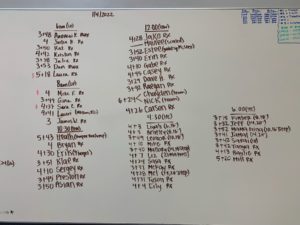Jake is working through The heavy round of “DT”!
__
Attention: The New Year Nutrition challenge Starts on Monday January 10th! We will be having a Q and A meeting on Tuesday January 4th at 7:00pm to go over all the details and answer any questions you might have! Make sure to put your name on the board if you are interested in participating! This year we will be using the “Whole 30” guidelines for our 30 day challenge! Click here for the rules.
__
WOD
“OPENING UP”
AMRAP 15:
10 Wall Balls (20/14)
15 Burpee Box Jump Overs (24″/20″)
20 Wall Balls (20/14)
15 Burpee Box Jump Overs (24″/20″)
30 Wall Balls (20/14)
15 Burpee Box Jump Overs (24″/20″)
…
Add 10 Wall Balls Per Round
*Score = Rounds + Reps
Example Score: if an athlete completes the round of 40 Wall Balls + 15 Burpee Box Jump Overs and completes 10 Wall Balls into the round of 50 . . . their score would be 4 + 10.
__
5FRx
SLEEP
Sleep Deficiency and Eating Behaviors
“Epidemiological studies show that insufficient sleep is independently associated with a higher risk of obesity. Clinical studies of of sleep-restricted adults show an increased hunger and calorie intake when participants are allowed free access to food. [7] A preference for late evening or nighttime food intake and increased snacking has been observed. [9] There also appears to be a food preference for higher carbohydrate and fat foods, which could partly explain the overall higher calorie intake.
Changes in hormone levels that signal either hunger or satiety have also been observed in clinical sleep restriction studies. Leptin is a hormone associated with satisfaction. When food enters the stomach, leptin is released from fat cells and travels to the brain where it signals the body to stop eating by creating a sensation of fullness. People with obesity may actually have very high levels of leptin; the more body fat one has, the more leptin is produced in fat cells. However, a condition called leptin resistance may occur in which the brain does not receive the usual signal from leptin to stop eating. In response, more and more leptin is released. Lower leptin levels as well as high leptin levels suggesting leptin resistance have been observed in sleep-deprived adults. [7]
Ghrelin, the “hunger hormone,” typically has the opposing action of leptin. It is released in the gut and sends hunger signals to the brain when someone is not eating enough. About three hours after eating a meal, ghrelin levels drop. Clinical studies have found that sleep restriction leads to elevated ghrelin levels. [9]
Despite this interesting theory of poor sleep leading to changes in appetite hormone levels, other studies have found no changes and therefore the association is still inconclusive. [9] Conflicting findings may be due to differences in the study participants (e.g., age, gender) and differences in how the researchers defined the duration and severity of sleep restriction.”
Full Article: https://www.hsph.harvard.edu/nutritionsource/sleep/


